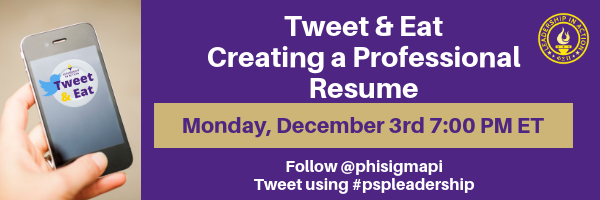 By the time you left high school, you were probably tired of being asked, “Where are you going to college”? Now, four years later, people want to know what are you doing after college. This seemingly innocent question can incite panic if you’ve yet to find your “dream job." But don’t worry, Phi Sigma Pi has some tips to help you in your job search.
By the time you left high school, you were probably tired of being asked, “Where are you going to college”? Now, four years later, people want to know what are you doing after college. This seemingly innocent question can incite panic if you’ve yet to find your “dream job." But don’t worry, Phi Sigma Pi has some tips to help you in your job search.
Your first job is the job search
New job seekers often send out too few applications, expecting to be accepted by one of the first. This shows you are confident in your abilities, but, remember; there are many qualified candidates looking for the same jobs. Treat your job search like a job. You can’t devote every second of every day to finding a job. This leads to burnout. But you can have a scheduled time, each day, to submit applications; try to complete at least a day. Apply for positions even if you aren’t sure you are 100-percent confident you are qualified. The worst that can happen is lack of interest.
 Campus resources
Campus resources
Don’t be afraid to ask for help. Check with your college’s Office of Career Services. Its sole purpose is to help students in job searches. Someone there can help you draft resumes and cover letters, schedule practice interviews and organize job fairs/postings for your school. Also, many college’s career offices continue to provide these options to new alumni.
The internet is your friend
Technology has made the job search much easier, but that doesn’t mean that it is simple.  Saavy job searchers still have to be aware of the modern methods of “beating the pavement.” Make sure you have a Linkedin account. It’s a good way to get your resume in front of prospective employers. Many companies recruit and post solely on LinkedIn. After being accepted for an interview, research the company, its mission statement, news releases and important information. Keep track of the places you’ve applied and what those companies were asking in their postings. Some companies move slowly to hire and might not reach out until after they have removed the posting. Having a record of their qualifications and job responsibilities will be helpful.
Saavy job searchers still have to be aware of the modern methods of “beating the pavement.” Make sure you have a Linkedin account. It’s a good way to get your resume in front of prospective employers. Many companies recruit and post solely on LinkedIn. After being accepted for an interview, research the company, its mission statement, news releases and important information. Keep track of the places you’ve applied and what those companies were asking in their postings. Some companies move slowly to hire and might not reach out until after they have removed the posting. Having a record of their qualifications and job responsibilities will be helpful.
Interviewing
The first step in many hiring processes is a phone or remote interview to narrow the field of candidates they’d like to interview in person. Treat phone interviews with as much importance as the face-to-face. Remember to thank the interviewers for their time; email is usually sufficient for a phone interview, but you might want a more personal touch -- handwritten note -- for an in-person interview. The main purpose of the face-to-face interview is show you are professional and to give specific examples of your experiences. Ask for a hiring process timeline so you know when to follow up. Treat every interview as a learning experience; afterward, think about your responses to the interviewers questions and how you can better answer them in the future.
Documents
A highly important part of the job search is having a good resume and cover letter. These are often the first interaction between a company and a prospective candidate. They can make or break your chances. Take time to personalize the resume and cover letter for each job application. Professionals can tell when you send a stock cover letter versus one that was personalized. Instead of being a restatement of your resume, cover letters are an opportunity to talk directly to the prospective interviewers -- show them why you care about the position and why you are qualified. Engaging stories are the best way to showcase your experience.
 If you would like more information and tips on resume building and networking, the Leadership in Action Team has you covered. They have several upcoming opportunities for personal development. The Tweet and Eat on Monday, Dec. 3, is dedicated to assisting with resume building. The spring Lunch and Learn webinar series is about professional development. Join in on Thursday, Feb. 14, as resumes, cover letters and interviews are discussed. On Thursday, March 14, learn all about networking.
If you would like more information and tips on resume building and networking, the Leadership in Action Team has you covered. They have several upcoming opportunities for personal development. The Tweet and Eat on Monday, Dec. 3, is dedicated to assisting with resume building. The spring Lunch and Learn webinar series is about professional development. Join in on Thursday, Feb. 14, as resumes, cover letters and interviews are discussed. On Thursday, March 14, learn all about networking.
Register for the upcoming events today.
Don’t get discouraged if you are not selected for a position you really want. Each position offers valuable experience; you can always look for your dream job after you’ve gained more experience. You are destined for great things in life; your Brothers will support you.
Alumni Quote:
“Don't be afraid to highlight PSP experience in your cover letter. You aren't going to be able to explain your experiences and leadership abilities in a few lines or less on your resume but this experience is often extremely valuable and applicable to the workplace.” - Jeanette Gaida, Epsilon Sigma ’11, Capital Alumni Chapter
Do you have advice to your fellow graduating cohort or future graduating seniors? Do you have photos of your graduation regalia? Send them to Christopher Kostelnik, Alumni Relations Coordinator, at ckostelnik@phisigmapi.org with a statement that we can use them, and they might be featured in a future blog post!
